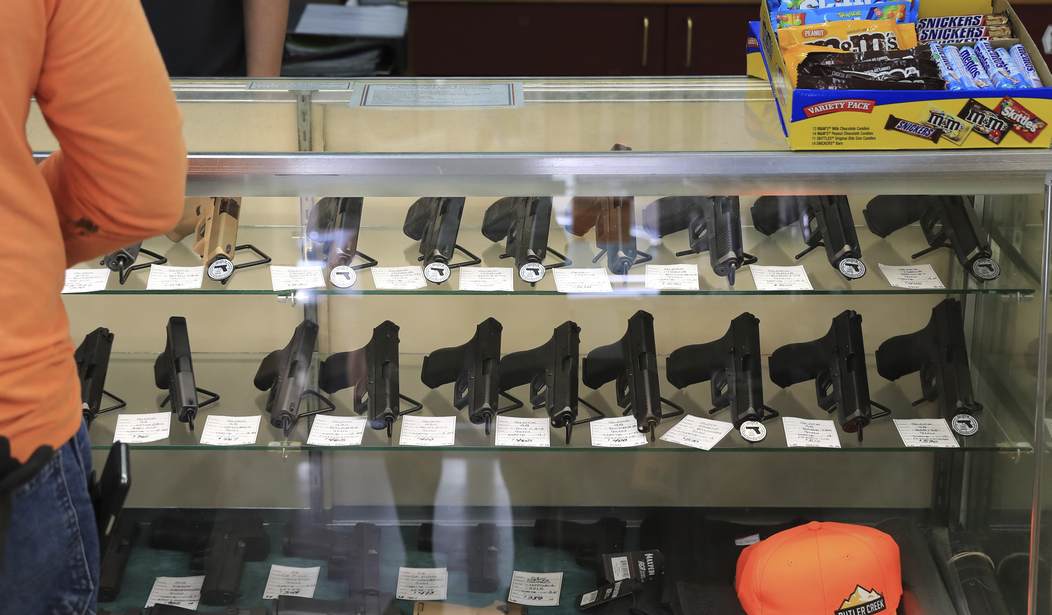The gun control bills are flying in Santa Fe as anti-2A lawmakers are racing to enact a flurry of new restrictions on residents; a sweeping semi-auto ban, prohibiting gun sales to adults younger than 21, and enacting a new 14 business-day waiting period on all firearms transfers that would be the longest in the nation. Unlike last session, where similar bills were bottled up in committee or voted down altogether, Democrats this year seem willing to go along with virtually every restriction demanded by Gov. Michelle Lujan Grisham, even as they tacitly admit that their bills are going to run into trouble in the courts if they’re enacted into law.
When State Sen. Joe Cervantes was questioned about that potential 14 business-day waiting period during a meeting of the Senate Health and Public Affairs Committee over the weekend, the anti-gun lawmaker studiously avoided answering a query from a colleague about whether that waiting period comports with the national tradition of gun ownership in the United States. Instead, he proclaimed that the Supreme Court is going to overrule its own decision in Bruen in just a few months, making any potential conflict with the “text, history, and tradition” test laid out in that case utterly moot.
“It’s an absurd ruling. And it’s an absurd ruling that will not stand, I believe, for the next six months because the Supreme Court will reverse itself and recognize the absurdity of Clarence Thomas’s opinion. Now, that sounds pretty arrogant of me, a Las Cruces street lawyer, to say that the Supreme Court wrote an absurd opinion, but I’m going to stand by that. And I’ll give you an example: Clarence Thomas, with the majority, held that any restrictions on guns had to be based on historic traditions, yet we as a country do not allow guns in this capitol. Some of you may disagree with that, but there’s no historical tradition about not allowing guns in government buildings.
Cervantes went on to say that there’s no historic tradition banning fully automatic firearms or rocket-propelled grenades or prohibiting the mentally ill or convicted felons from possessing firearms, arguing that the Court will have no choice but to reverse itself when it issues its decision in Rahimi, which deals with the federal prohibition on gun ownership for those subject to a domestic violence restraining order.
“When you take the Supreme Court’s argument to its natural conclusion and say there has to be a historic tradition to limit guns, it’s an absurd decision, and the Supreme Court’s going to recognize that pretty quickly.”
While the Court may very well conclude that Zackey Rahimi should not have been allowed to possess a firearm after a domestic violence restraining order was granted, I don’t think the justices are going to have to invalidate Bruen to do so. Instead, I suspect that if the justices rule against Rahimi, they won’t backtrack on Bruen but will instead talk about a national tradition restricting gun ownership by individuals deemed to be “dangerous”; something that would allow them to deny Rahimi his ability to possess a firearm while leaving the door open to challenges from individuals like Bryan Range, who became a prohibited person after he was convicted for falsifying his income on an application for food stamps several decades ago.
Neither Range nor Rahimi have anything to do with waiting periods, but the issue has come up in the courts since the Bruen decision was handed down. Of most importance to the bill authored by Cervantes, a federal judge in Colorado denied an injunction against a three-day waiting period last November, ruling that the Second Amendment doesn’t cover the commercial sale of firearms. U.S. District Judge John L. Kane, Jr. bizarrely argued that the “purchase and delivery of an object (here, a firearm) is not an integral element of keeping (i.e., having) or bearing (i.e., carrying) that object,” even though if you can’t take possession of that firearm in a timely manner there’s no way for you to keep or bear it.
The Supreme Court, on the other hand, specifically noted in Bruen that “lengthy wait times in processing license applications” could lead to constitutional challenges of “shall-issue” carry regimes, which would suggest that lengthy wait times in acquiring a firearm would also be problematic from a constitutional perspective. A 14 business-day waiting period is not only an outlier from the perspective of our national tradition of gun ownership, but contrary to even modern federal gun laws. It’s the National Instant Check System, after all, not the National Three Day Waiting Period System. Transactions can be placed on hold for up to 72 hours while a check is being conducted, or up to ten business days if the purchaser is under the age of 21, but those are still exceptions. The standard is for those checks to be as close to “instant” as possible for as many gun owners as possible, as opposed to Cervantes’ blanket waiting period on all firearm transfers in the state.
The senator can proclaim Bruen to be an absurd decision all he wants, but that doesn’t change the fact that it’s still the guiding bit of jurisprudence when dealing with modern gun laws. And based on Bruen and the test it outlined, a 14-day waiting period isn’t going to pass constitutional muster unless a judge like Kane contorts the text, history, and tradition test to… well, the point of absurdity. The sad thing is that, so far anyway, Cervantes has convinced his fellow Democrats to go along. SB 69 has been advancing along party lines in the New Mexico legislature despite the clear constitutional issues at hand, and it may very well face a court challenge of its own shortly.









